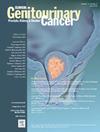卡博赞替尼治疗晚期肾细胞癌的有效性和安全性在西班牙和葡萄牙的现实世界实践:SOGUG-SPRWEC研究
IF 2.7
3区 医学
Q3 ONCOLOGY
引用次数: 0
摘要
背景:SPRWEC研究在真实的西班牙和葡萄牙环境中调查了卡博赞替尼在晚期肾细胞癌(RCC)患者中的有效性和安全性。患者和方法:观察性、双视角、多中心研究,包括2016年10月至2020年5月期间接受卡博赞替尼作为第二或后续治疗线的晚期RCC成年患者。主要终点为无进展生存期(PFS)。结果:共纳入258例患者(平均[SD] 62.5[11.0]岁,男性75.6%),55.8%患者既往接受过免疫治疗。中位随访时间为34.3个月。中位PFS为7.63个月(95% CI, 6.64-8.72)。中位总生存期(OS)为15.36个月(95% CI, 11.58-19.11);客观有效率(ORR), 29.5% (95% CI, 24.0-35.4);至首次反应的中位时间为3.27个月(95% CI, 3.03-3.68);中位缓解持续时间为9.77个月(95% CI, 7.24-12.63);中位停药时间为6.97个月(95% CI, 5.79-8.42)。既往免疫治疗增加ORR (OR 2.132),降低OS (HR 1.529)。ECOG 0-1和剂量减少与PFS增加相关(HR 0.470和0.558);不良和中度MSKCC (HR 3.861和1.681)和IMDC风险(HR 2.558和1.537)与PFS下降有关。最常见的不良反应是腹泻(41.9%)、虚弱(34.9%)和厌食(18.2%)。结论:在现实世界中,Cabozantinib作为晚期RCC的第二或后续治疗线的有效性和安全性与临床试验中观察到的相似。在先前的免疫治疗(一线标准治疗)之后,这种治疗导致ORR增加,OS降低,而PFS没有变化。本文章由计算机程序翻译,如有差异,请以英文原文为准。
Effectiveness and Safety of Cabozantinib Treatment in Patients with Advanced Renal Cell Carcinoma in Spanish and Portuguese Real-world Practice: The SOGUG-SPRWEC Study
Background
The SPRWEC study investigated cabozantinib effectiveness and safety in patients with advanced renal cell carcinoma (RCC) in real-world Spanish and Portuguese settings.
Patients and methods
Observational, ambispective, multicenter study including adult patients with advanced RCC receiving cabozantinib between October 2016 and May 2020 as second or subsequent treatment line. Primary endpoint was progression-free survival (PFS).
Results
About 258 patients (mean [SD] age 62.5 [11.0] years, 75.6% male) were included, 55.8% with prior immunotherapy. Median follow-up was 34.3 months. Median PFS was 7.63 months (95% CI, 6.64-8.72). Median overall survival (OS) was 15.36 months (95% CI, 11.58-19.11); objective response rate (ORR), 29.5% (95% CI, 24.0-35.4); median time to first response, 3.27 months (95% CI, 3.03-3.68); median duration of response, 9.77 months (95% CI, 7.24-12.63); median time to discontinuation, 6.97 months (95% CI, 5.79-8.42). Prior immunotherapy increased ORR (OR 2.132) and decreased OS (HR 1.529). ECOG 0-1 and dose reductions were associated with increased PFS (HR 0.470 and 0.558); poor and intermediate MSKCC (HR 3.861 and 1.681) and IMDC risks (HR 2.558 and 1.537) with decreased PFS. Most common AEs were diarrhea (41.9%), asthenia (34.9%), and anorexia (18.2%).
Conclusion
Cabozantinib’s effectiveness and safety as second or subsequent treatment line for advanced RCC in real-world settings are similar to those observed in clinical trials. This treatment after prior immunotherapy, the front-line standard of care, resulted in increased ORR and decreased OS, without changes in PFS.
求助全文
通过发布文献求助,成功后即可免费获取论文全文。
去求助
来源期刊

Clinical genitourinary cancer
医学-泌尿学与肾脏学
CiteScore
5.20
自引率
6.20%
发文量
201
审稿时长
54 days
期刊介绍:
Clinical Genitourinary Cancer is a peer-reviewed journal that publishes original articles describing various aspects of clinical and translational research in genitourinary cancers. Clinical Genitourinary Cancer is devoted to articles on detection, diagnosis, prevention, and treatment of genitourinary cancers. The main emphasis is on recent scientific developments in all areas related to genitourinary malignancies. Specific areas of interest include clinical research and mechanistic approaches; drug sensitivity and resistance; gene and antisense therapy; pathology, markers, and prognostic indicators; chemoprevention strategies; multimodality therapy; and integration of various approaches.
 求助内容:
求助内容: 应助结果提醒方式:
应助结果提醒方式:


